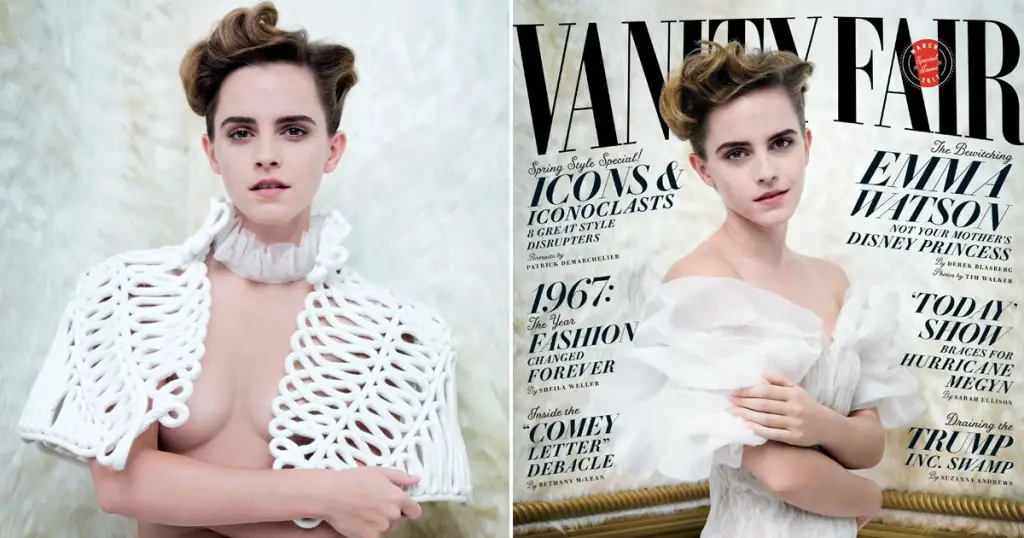In the March issue of “Vanity Fair,” Emma Watson sparked controversy when she posed for a photograph wearing only a rope-like, white top on her upper half, revealing most of her chest. The suggestive photograph caused many to call into question the HeForShe spokeswoman’s representation of feminism. British radio commentator Julia Hartley-Brewer criticized Watson on Twitter, claiming the image’s provocativeness goes against the feminism that the “Beauty and the Beast” star so adamantly advocates. In her tweet, Hartley-Brewer says, “Feminism, feminism…gender wage gap…why, oh why, am I not taken seriously…feminism…oh, and here are my tits!”
Some also pointed to quotes pulled from a four-year-old interview in which Emma Watson seemed to criticize Beyoncé’s expression of sexuality in her 2014 album. Many were quick to brand the actress a hypocrite for the way she celebrated her own body while seemingly chastising Beyoncé’s. While Watson has since addressed the issue, the swiftness with which she was labeled a “bad feminist” reveals a much deeper, unfortunate truth about the current state of the movement.
The Key Word Is Choice
By definition, the concept of feminism is simple: equality. This idea, though, has continued to be misconstrued by a copious amount of people, even those who identify with the label. Many believe the image of a feminist is one who rejects all forms of traditional femininity and suppresses their own sexuality as a means of power.
Because the social movement is based on equality, this stereotype is one image of a feminist, but there are infinite others. What one woman, or other genders, deems as empowering may be oppressing to another. Being a feminist comes with an understanding that everyone, regardless of gender, race or class, is a human capable of making his or her own decisions.
When Julia Hartley-Brewer implied that being sexual and being a feminist were mutually exclusive, she joined many others in undermining the rallying cry of the entire movement. It’s all about choice.

A common argument among Watson critics is that the photographs were self-objectifying, but there is a difference between making the choice to show your body in a photograph and having someone sexualize your body without your consent. That difference is agency.
Emma Watson made the choice to pose for the photograph, embracing her body and giving consent for the magazine to share it with the world. She felt that the image was an act of empowerment, and because of that, no one should be able to tell her she’s wrong. In her own words, as a response to the controversy, she was correct is saying, “I really don’t know what my tits have to do with it.”
We’re All Bad Feminists
The outrage over a simple photograph is a testament to the divisiveness of modern feminism. Too many are quick to reprimand others because they don’t meet the image of what they consider the right kind of feminist. But what does that mean?
To some, a woman can’t be both intelligent and concerned with her appearance. She can’t be an advocate for women’s rights and sexual. She can’t speak about the gender pay gap and then show her “tits.”
The group of feminists who share this system of beliefs are constantly at odds with the other side of this debate, believing that their opinions are universal truth. They fail to see that the world is not a perfect place, and there is no such thing as a perfect feminist.
In one of my favorite books, “Bad Feminist,” Roxanne Gay describes her experiences within the movement, and she observes this phenomenon of contradictions within feminism that “make it seem like there is a right way to be a woman and a wrong way to be a woman.” There is no way for women to live within the conditions of perfect feminism. Some aspect of your life will always be at odds with the label, and that’s okay.
I will be the first to admit that I am a feminist, but sometimes, for lack of a better phrase, I really suck at it. I’ve said things I regretted and tore other women down for no good reason. I have confused disagreeing with a woman’s choice for the woman being “anti-feminist.” I learned from those moments, and they have helped to shape the feminist lens through which I now view the world (which is still not the right lens).
What some conveniently forget is that people grow. Over time, their ideas and morals evolve as they become more educated and have new experiences. When people chose to pull quotes from a four-year-old interview, not only did they neglect the entirety of the article, but they disregarded the idea that Watson’s thoughts on feminism and sexuality could have changed.
Society should not be quick to forget someone’s past words and actions, but they should be taken with a grain of salt because as a species, humans are constantly changing and adapting. There is plenty of room for mistakes.
The modern-feminist movement has, unfortunately, derailed in some aspects, and it spends a great deal of time fighting within itself, neglecting to remember that, regardless of what faction you belong to, feminism is meant to advocate equality for all.
Whether you believe Emma Watson’s choice to show her body was the right one and whether you believe in feminism, the movement is still meant to fight for everyone’s rights, not just those that best align with your personal definition. Somewhere along the line, feminism forgot that. The movement has started to feel like an exclusive club, permitting entry only to a small number of elites, leaving most to watch from the windows, discouraged that they’ll never make it in.
There is no such thing as the right kind of feminist. There are only bad feminists, and as Roxanne Gay says, “I would rather be a bad feminist than no feminist at all.”


















[…] Read the full article from the Source… […]
[…] with the sex-positive movement, the old argument still resurfaces time and again—just look at the feminist backlash Emma Watson sparked after posing in a semi-nude “Vogue” photo-shoot last […]